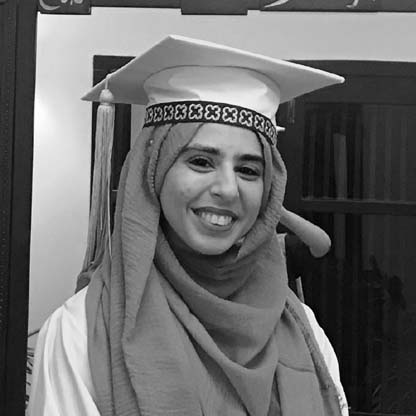
WAJIHA GHAZANFAR FAROOQ
Aspiration Statement
As a career, I am inclined towards working in the healthcare sector, particularly in public health, research and policymaking. I aim to work in the health sector for a few years before going on to pursue my master's in public health/public policy and enhance my skillset.
Core Skills
- Health Policy
- Qualitative Research
- Design Thinking
- Policy Memo Writing
- Participatory Action Research
- Speculative Design
- Project Planning
- Field Mapping
- Stakeholder Analysis
- Options Analysis
Academic Awards / Achievements
- Dean’s List - Spring 2017 & Fall 2017
- President’s List - 2017
Experience
Internship / Volunteer Work
- Dealia Trade Sp. z o.o. - Manager Design & Media
- ReD Associates - Consultant
- Getz Pharma - Associate - Public Health & Research
- Marvi Mazhar & Associates – Research Intern
- Playground: TransDesign & Innovation Lab (In collaboration with Karachi Neighborhood Improvement Project - World Bank) - Research Assistant - Design Researcher
- Zofeen Ebrahim - Freelance Journalist - Research Assistant
- The Kidney Centre (Post Graduate Training Institute) - Volunteer
Publications / Creative Projects
- Publication on Development and Public Spaces in Karachi: Marvi Mazhar & Associates. (2019). How ‘development’ undid Seaview - Samaa Digital.
- Policy recommendation to Gohar Textile Mills (Pvt.) to reduce the high prevalence of respiratory diseases amongst textile factory workers in Faisalabad.
Final Year Project
Project Title
Senior Research Seminar - Final Paper: What Effect does the Biometric System at Habib University have on Student Attendance?
Description
My research aimed to investigate the fundamental philosophical distinction between students’ physical attendance in class and the “experience of attending”. My paper incorporated primary and secondary data insights to highlight how attendance recording systems such as biometric scanners often fail to capture what it means for students to be enthusiastic about their learning experiences at educational institutes. Interviews and surveys conducted with students and administrative offices at Habib showed that there is a need to create a student-facing attendance policy which focuses more on inculcating intrinsic motivation among students to attend classes. Results showed that setting stricter attendance policies does not motivate students to attend classes, but simply forces them to be physically present due to the fear of consequences. Whereas research in school psychology illustrates that students’ ability to perform well academically depends on a combination of individual and social factors that extend beyond simply memorizing course information.